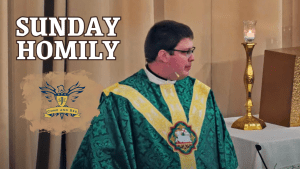
Father Randy Koenigsknecht
Watch the Homily
Listen to the Homily
In this reflection, Father Randy unpacks the Five Precepts of the Church — simple yet powerful foundations for living out our Catholic faith. From attending Mass to fasting and confession, these guideposts help us grow closer to Christ and “run the race well.”
Read the Homily
Father Randy: I’ve competed well. I have finished the race. I have kept the faith. Lord, may my last words be as awesome as these ones. And as Christians, this is what we want to be able to say at the end of our lives. Most people would probably struggle to define, like, what are the basic standards for being a practicing Catholic? The Church has actually given us five principles—concrete, very concrete standards for living as a practicing Catholic. And these are known as the five precepts of the Church.
The first one is that Catholics are to attend Mass every Sunday and on holy days of obligation to keep holy those days. Sunday is the day that’s been set aside for us to worship God, to enter communion with Him. When we worship God, we recognize Him for who He is. He’s the one who made everything. He holds us in being. He’s the one who loves us, who offers us eternal life and joy with Him.
The second precept is to go to confession at least once a year. And then the third is to receive the Eucharist at least once a year during the Easter season. In any marriage and in any relationship in general, it’s not enough just to imply that you’re sorry when you screw up. You actually need to apologize directly to them. And likewise, it’s often not enough just to assume that your spouse knows that you love them—they most likely want to hear it, at least every now and again.
But if we need to do that with our human relationships, if we need to say those words, we should also be willing to do the same in our relationship with God. They also help form that foundation. And the way that we tell God, “I’m sorry,” and the way that we say, “I love you,” is by going to confession and receiving Him in the Eucharist.
The fourth is to observe the days of fasting and abstinence that have been set up by the Church. So on Ash Wednesday and Good Friday, we eat less. We abstain from meat. And then the rest of the Fridays of Lent, we don’t eat meat. The Church also strongly recommends that during the weekdays of Lent, we have some kind of fasting, some kind of penance that we take on because it’s really good. They’re meant to prepare us to celebrate the passion, death, and resurrection of Jesus.
They help us to enter into what’s happening at Easter. That’s why we have all this time of Lent—so that we can really be walking with Him, walking the way of the cross. And at every Sunday Mass, we also celebrate that very same mystery: the life, death, and resurrection of Jesus.
During Lent and during these times of fasting—just any Friday—we’re invited to really see ourselves carrying our crosses with Jesus, walking with Him, putting to death our sins with Him on the cross, and rising with Him to new life and freedom. That’s the goal of the fourth. And if you hear these things and you recognize, maybe I’m not doing so great at all of them—that’s okay. This is the time to start working on it. This is a good day to start, to make a personal commitment and ask God to give you the grace to follow through.
Now, maybe you’re already doing all of these things. Great work. Praise God. But now is the time to ask Him how He’s inviting you to go deeper. These precepts get us on the right track for the race. They give us the basics. But if we want to really run well, to run strongly and be competitive, it often requires more from us. So we have to keep asking God how He’s inviting us to grow, to go deeper, so that at the end of our lives, we can really say with St. Paul: I have competed well. I have finished the race. I have kept the faith.